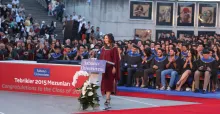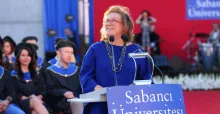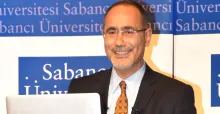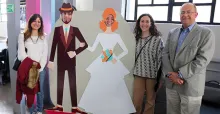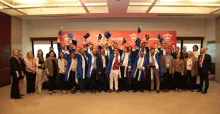Sabancı University Founding Board of Trustees Chair Güler Sabancı gave life advice to new graduates at the commencement ceremony.

"You have been raised well and equipped with diverse qualifications. The philosophy of our university gave you benefits like free thought, freedom from prejudice, openness to different thoughts and opinions, embracing differences as assets, and valuing the importance of knowledge."
“Remember: the only thing we are certain about the future is that it will be different. Therefore one must be open to change. This is a sign of self-confidence and self-respect."
"We live in a digital age. Everything around us is becoming digital. Use technology to simplify life and create value."
"Know yourselves well. Have confidence in yourselves but never stop soliciting opinions, questioning, and continuing to learn."
400 bachelor’s degrees, 178 master’s degrees and 16 doctorate degrees were awarded at the Commencement Ceremony held on the Sabancı University campus. Among Sabancı University graduates this year were international students from 25 countries.

"The voters did their part and made their preferences manifest. Now it is the turn of the elected. We expect them to reach an understanding as soon as possible, form the new government, and start working without any undue delay."
Güler Sabancı discussed the elections of June 7th. She said that ballot rates were high and the voters showed their desire to have four political parties in the Parliament, which was a step towards peace and understanding in the context of the Turkish democracy. Güler Sabancı said that the voters did their part and made their preferences manifest, continuing “Now it is the turn of the elected.”
Sabancı noted that democracy meant consensus and solutions, and considering the great issues ahead of Turkey today, she called for the elected to reach an understanding as soon as possible, form the new government, and start working without any undue delay.
Güler Sabancı drew attention to the fact that there were 97 women in the Parliament this term, which is a record high in the history of Turkey. Güler Sabancı said “Although this result is 'pleasing' it is by no means 'satisfactory.' Women represent 50% of our population and their participation and representation in business must increase if women are to achieve the status they deserve. Gender equality is an important issue worldwide, and here in Turkey we still have a lot of ground to cover. With the new government, we should leave the difficult days behind and keep working diligently for Turkey - all together."
"Development in Turkey was never only economic for the Sabancı Family."
Sabancı University Founding Board of Trustees Chair Güler Sabancı began her speech by remembering and thanking people who gave support to Sabancı University.
Güler Sabancı said that development in Turkey was never only economic for the Sabancı Family, and that they have always believed that social development must go in tandem with economic development. She said that Sabancı University was the most important, labor-intensive, longest-term and largest project ever undertaken by the Sabancı Foundation.
Remembering the late 9th President of Turkey, Süleyman Demirel, Güler Sabancı said "The late Demirel supported our university since the beginning and was with us both for groundbreaking and inauguration. May his soul rest in peace."
"We imagined an innovative, different university."
Güler Sabancı said that when they had set off to found a global university twenty years ago, they had imagined a university that was innovative and different. Sabancı said that they made a difference in higher education in Turkey, choosing to create a new and unique model that was not a reiteration of existing university models.
"This success belongs to us all!"
Güler Sabancı spoke on the international achievements of Sabancı University:
"We are delighted to see that the values we adopted when we began this journey and sought to uphold ever since are among the criteria employed by international rankings.
Our university may be only in its 16th academic year, but we have been gaining recognition on Times Higher Education rankings since last year.
We were 15th among the best universities in emerging economies. This bolstered our pride and confidence for further success.
Then, on April 29th, we ranked 13th on the "100 Under 50" rankings, where we were included for the first time.
We were further honored and delighted to be included in the Asian Universities Rankings revealed only a few weeks ago. We were the highest-positioned private university entering the list for the first time."
Güler Sabancı said that a factor which ensured further international achievements by Sabancı University was the emphasis on research as well as education for sustainable success. Güler Sabancı said, “The number of research papers per faculty member, and the number of citations received to these papers, increase day by day. Our research funds keep growing. All of these are extremely important to me as they display the research power and success of our university. This success belongs to us all!"
“I am confident that the Reunion... Buluşma Exhibition will move you with its youth and energy."
Saying that the high position achieved by Sabancı University was proof that they were on the right path and motivated them to advance further, Güler Sabancı expressed her pride in the achievements of Sabancı University alumni in every area.
Güler Sabancı mentioned the exhibition “Reunion… Buluşma” by young Sabancı University alumni, saying that the exhibition is a first and a different example of achievement. Explaining that the exhibition, available for viewing at the Sakıp Sabacı Museum in Emirgan, was very special to them, Güler Sabancı said “Young artists, graduates of Sabancı University, reunited at home for the first time. I am confident that the Reunion... Buluşma Exhibition will move you with its youth and energy."
"We live in a digital age. Everything around us is becoming digital. Use technology to simplify life and create value."
Addressing the new graduates, Güler Sabancı said that they would achieve success, trigger change and make a difference in business or academic life just like the 7000 alumni before them. Güler Sabancı continued, "You have been raised well and equipped with diverse qualifications. The philosophy of our university gave you benefits like free thought, freedom from prejudice, openness to different thoughts and opinions, embracing differences as assets, and valuing the importance of knowledge."
Emphasizing the importance of constant focus on the future, Sabancı said “Remember: the only thing we are certain about the future is that it will be different. Therefore one must be open to change. This is a sign of self-confidence and self-respect."
Güler Sabancı said “You can’t change everything whenever you want. Have COURAGE to change what you can. Have PATIENCE for what you cannot. And have WISDOM and KNOWLEDGE to discern between the two.
Saying that the graduates were beginning a new era of their lives where it is normal to have dreams as well as concerns, Sabancı said: "Know yourselves well. Have confidence in yourselves but never stop soliciting opinions, questioning, and continuing to learn."
Güler Sabancı said that we live in a digital age and everything around us is becoming digital, advising graduates to: "Use technology to simplify life and create value."
Sabancı noted that success may await graduates as well as disappointment, continuing: "You may sometimes be left with difficult choices. In this case, universal values should be the star that guides you. You should navigate by human rights, equality, rule of law, and science and knowledge."
"The freedom of choice at Sabancı University, our human-focused mode of operation, constant questioning and striving for the better is an example for Turkey - an example for whole continents."

















